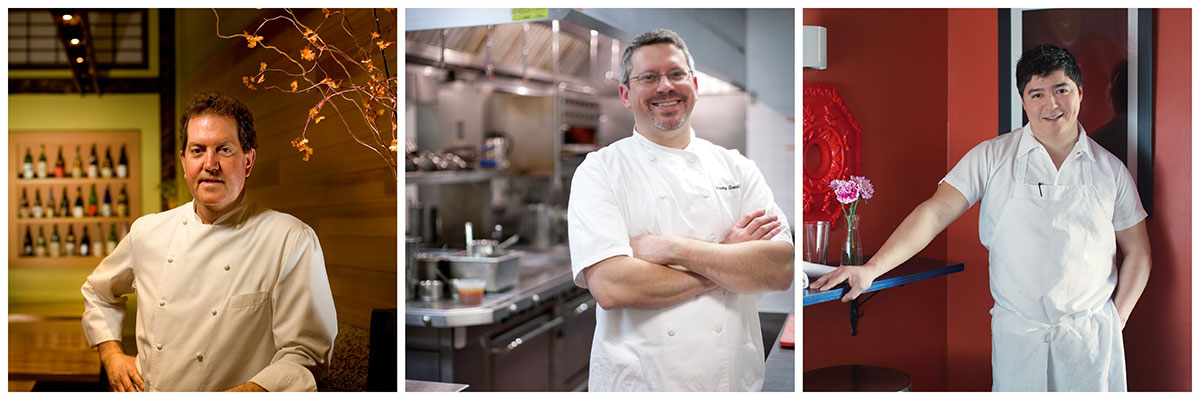What Do Chefs Really Think About Health and Nutrition?
People are much more health-conscious and aware of their food choices than in years past, and so are the chefs who are cooking the fare. We asked three acclaimed Boston chefs (Tim Cushman, O Ya; Marcos Sanchez, Tres Gatos; and Jeremy Sewall, Row 34 and Island Creek) what they think about the trend towards healthier food, and what opinion, if any, they have on health and nutrition.

Chef Cushman, photo by Erik Jacobs; Chef Sewall, photo by Michael Piazza, and Chef Sanchez, photo by Lara Kimmerer
In your day-to-day role as a chef, do you think about health and nutrition?
Cushman: I do. I think it naturally happens. I’m personally very conscious of nutrition and health, so I think that gets integrated into the ideas that I do. I think there are so many things going on as far as health and nutrition that I think if you’re a chef, you can’t help but think about nutrition when you’re working on ideas.
Sanchez: When putting together a menu, I typically consider the season that we’re in. In the winter, people tend to like heavier things and warmer flavors, so obviously there’s more fat in those [dishes]. In the summertime, people tend to want to eat a little less, and so I do take that into consideration. I try not to overload things with butter or fat, but I also don’t shy away from it. As they say, fat is flavor.
Sewall: No. My job is to feed the guests and offer them an experience. My job is not to worry about calories or their cholesterol. We deal with very fresh fish, very fresh produce, and things like that. The menu is seasonal, and eating seasonally and locally is always a healthy thing.
When you’re creating menus, what is foremost in your mind?
Cushman: Flavor. We always focus on the taste; you want to create craveable flavors and craveable food. That’s what we always try to do.
Sanchez: The flavor. I want everything to be as good as possible. Really, at the end of the day, flavor is what we’re after here.
Sewall: It always starts with the product. Quality and interesting [products] that are relevant to the restaurant. From there we’re just trying to put great flavors together, and layer flavors in an interesting way without diluting or muddling what we started with.

Island Creek Oyster Bar interior image via Michael Piazza
Do you pay attention to diet trends and adjust your menu at all? For example, will any of you be going gluten-free?
Cushman: We pay attention to what’s going on, and not only in our restaurant but also to what people are paying attention to. In the past few years there’s been such a huge influx of dietary concerns, so we have a lot of different menus and can adapt to any situation.
Sanchez: I’m faced with it almost every single night, so that’s a huge consideration. We used to have a lot more bread and nuts on the menu. That’s because there’s been a huge trend in people being gluten intolerant, and also [various] allergies. It does shape the way the menu is written, and actually, over the years, I’ve been eating less gluten. Those trends have kind of changed the menu and also my diet.
Sewall: No, I don’t pay attention to it, but if a guest comes in and wants a meal with no gluten, or wants no butter fat or is a vegetarian or has allergies, we’re extremely accommodating.
What would you think if restaurants had to label dishes with nutritional information?
Cushman: I don’t want to take the fun out of dining, where you have to post everything on a menu, because another thing is that restaurants are very economically challenged to remain successful. You’re just taking the fun out of every restaurant you go into when all the nutritional information is on there.
Sanchez: I would hate to have to label my food. It’s already bad enough that I have to list all ingredients for allergies; it takes a lot of time to make sure that the entire staff knows what’s in all the food. As a cook, I like to throw things together and utilize scraps around the kitchen. It would be a huge undertaking for a chef to have to label everything.
Sewall: It would be impossible. It would take the romance out of cooking. It would take the romance out of going out to eat. It would take the romance out of food. Am I responsible to make sure you know how many calories or grams of fat are in your dinner? No. You order a steak medium-rare, my responsibility is to cook a perfect steak and make sure it’s tasty and served in an environment with great service and great atmosphere. You want to count calories, go count calories. You want to have a good time, come eat here.

O Ya exterior image by Amy Braga
Do you feel that there’s any obligation on the part of restaurants at all, in terms of health?
Cushman: If somebody wants to eat what they want to eat, that’s their decision. That’s an individual choice. I do pay attention to nutrition; I’m fascinated by it. I also think when somebody eats, it’s not an endgame once they get it in their mouth – it’s going to go all through your system, and I don’t want people to get indigestion because that’s still a continuance of the experience of the restaurant.
Sanchez: If we were feeding them on a consistent basis, then maybe yes. I just like cooking great food and I love to see people enjoy it. That makes me happy.
Sewall: No, absolutely not. There is no obligation. If your goal is to be a health-food restaurant then that’s your obligation, but that’s not my responsibility. My responsibility is to offer a well-rounded dining experience – interesting, creative food that I feel is an expression of the restaurant itself, but counting calories is not my job.
What about the stereotype that restaurants are inherently unhealthy?
Cushman: It depends on the type of restaurant. If you do your homework you can eat healthy even if you go to fast food restaurants. You can figure it out if you think it out.
Sanchez: I think that’s a stereotype for certain restaurants, such as your larger national chains. But we make everything from scratch; I know where everything comes from.
Sewall: You can’t blame restaurants for your own cholesterol or for gaining too much weight. Splurging once in a while on a large fry and a burger is a great way to feel good once in a while, as long as you’re not doing it every day.

Tres Gatos image by Lara Kimmerer
Do you think dining out is healthy or unhealthy?
Cushman: I think there’s a natural trend in the restaurant industry towards more conscientious cooking. Everyone is jumping on the health bandwagon, which is a good thing. I think it’s a great trend and that it’s going to trickle down in a big way into restaurants.
Sanchez: At our restaurant you can have different types of experiences. You can get a book and a glass of wine, or just thumb through records and not buy anything, or come in for a long dinner with a big party. It all sort of ties together. They all play into our happiness a little bit.
Sewall: In the restaurant world, eating is a celebration. It’s a time to come together with friends and family. I just don’t think it’s my job to figure out what’s good for people and what’s not good for people. I’m not worried about health. I want people to have a good time. My motivation is to stimulate the senses, not worry that I’m putting too much butter or cream in something.
Are you healthy in your day-to-day life outside of the restaurant world?
Cushman: I’m not a fanatic, but I’m very conscious of my health. The Chinese look at food as medicine, and I do, too. I think it is the original medicine, really. I find that just eating very light during the day, I keep myself more energetic, ambitious, and aware. But you need variety too, which is why I allow myself to eat chicken wings and watch football just like anybody else.
Sanchez: As long as I can remember, a healthy diet was always key. And now, I’m very conscious of how I eat because it really does start to affect you more than when you were younger. I find myself needing more energy and certain foods make you feel better. I drink a lot less beer than I did before. I also drink a lot more red wine. I’ve learned that things add up, and they add up tremendously over time. What I eat is really going to dictate how my day goes.
Sewall: I couple of years ago I lost 52 pounds. I had high cholesterol and high blood pressure, and working in restaurants is not a healthy lifestyle unless you make it one. You’re surrounded by food, you’re surrounded by alcohol, you work late hours, you’re in a stressful job, and that for 20 years catches up to you. So I made a conscious effort to be healthy and eat better and I think about that all the time. As I’ve had kids, thinking about what I’m feeding them has been an interesting evolution for me. When I retire, school lunches are going to be a big thing that I champion. Every day I’m very conscious about what I put in my body; it’s very important in my day-to-day life.


